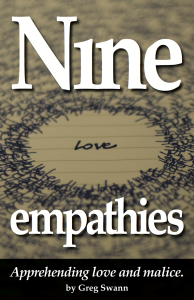
Why would anyone ever want to suppress that?Photo by: Loren Kerns
I am wondering about dealing with emotional reactions. What do you think of this attitude: you shouldn’t try to control your emotional reactions. By which I mean, if you feel angry, you shouldn’t attempt to salve that anger, instead you should acknowledge its reality and respect it as genuine. The opposite of this would be denying anger, attempting to diffuse it when it arises, or to attempt to explain it away in your own mind.
That is not to say that the emotion should be acted upon, or even that it should influence your decisions. But shouldn’t it be acknowledged and accepted as a valid part of your subjective experience?
I think this is exactly right, both the ontology and the teleology – the being and the shoulding.
An emotional response is an existential fact, an actual, undeniable phenomenon of nature. To affect to pretend that this reaction is unreal is an obvious error, as the pretense makes plain. Likewise to attempt to reject it post hoc. Ghosts do not become real by your affected belief in them, and remorse does not vanish because you wish it would.
Moreover, emotional reactions are important facts of reality: They are the feedback mechanism of your body, of your mind – ultimately of your whole life. Your emotions are providing you with vital information about what is going on right now, but they are also the barometer of your whole emotional life, going back to your birth and possibly before and going forward to your demise.
How is that so? Because your emotional response to the event you are reacting to is the instant manifestation of your pre-established habituated empathy strategies. How you feel now is a reflection of how you have felt in the past, and that rolling history is itself the best predictor of how you will feel in the future.
Who you will be is who you have been, yes, but who you have been is the expression of the different values you have assigned, over time, to reptilian and mammalian empathy strategies. I use my own reinterpretation of the DISC personality profile to apprehend all this in a comprehensible way: Your habituated value pursuits (safety or love) and your habituated social behavior (aggressive or affectionate) will prove over time to be a very strong predictors of how you will make your choices, and of how you will feel about them in real time and enduringly thereafter.
Why does that matter? Because if you ask me, a Driven/Incandescent, about negative emotions like anger or despair, I will dismiss them with a derisive contempt. Everything in the rear-view mirror is behind you. Age quod agis – do what you’re doing now. Positive emotions, by contrast, are much like acceleration in a car: Notable only when absent. This is how Driven people manifest their drives – and how they lead other people to achieve more than they ever knew they could.
That’s not wrong. It’s hugely right – for me. Cautious, Incandescent and Sociable people all think my way of responding to the world is wrong, and even Driven/Cautious and Driven/Sociable people will differ in significant but predictable ways from my way of seeing the world. And none of this is wrong. You are who you are as the sum and consequence of who you have been, and while you can resolve to choose differently going forward, you cannot alter or undo your past choices – nor coerce your present or future emotional responses – no matter how much you might want to.
I think this question matters because of Ayn Rand’s stupid insistence that “emotions are not tools of cognition.” Taken as a redundant restatement of the Appeal to Emotion, this is both obvious and obfuscatory. But this is not how people take it. Rand was a Cautious/Incandescent, a very aggressive style of mind, and what she meant by those words – and what her grim, repressed victims heard – was this: “If your emotional reactions do not conform in every particular to my testimony about my emotions, you are not just epistemologically wrong, not even just morally evil – you are metaphysically corrupt.”
Why must this be so? Because her followers – and followers as such, considered as a class – are Sociables. Driven people hardly ever listen to anyone, and only then long enough to figure out what to do next. The Incandescent have two mouths and one ear. To the extent that Cautious personalities hew to Ayn Rand, they do their hewing scrupulously, with perfect apple-polishing compliance. Only the Sociable want to belong for the sake of belonging, and the Sociable are the folks least likely to have corralled, diverted or sublimated their emotions.
The overwhelming majority of people attracted to any movement will be Sociables – the people most likely to experience strong emotional reactions, and the people least adept at marshaling those responses. And to those people, Ayn Rand said: “That which you cannot avoid experiencing – your emotional reactions – marks you as being irredeemably corrupt.”
This is inference on my part, but I think this is where this question comes from, from the insistence by Cautious big-O Objectivists that Sociable Objectivists aren’t repressing their emotions hard enough. If “emotions are not tools of cognition,” then, it could be argued, having them is anti-cognition. This is far beyond being merely wrong, since there is no alternative to the existential, but it is the perfect portrait of anyone who willingly submits to a Cautious Tyranny: Since moral goodness is expressed only by perfect compliance with the perfect order of everything, good people will betray not the smallest hint of any deviation. Accordingly, good people express only those emotions Ayn Rand said she felt. People who do otherwise are not just wrong but wreckers of the perfect order of everything. And while you yourself know that you do not at all times feel what Ayn Rand said she felt, your only hope of retaining your status within the group is to hide who you really are, right now, in order to portray your self as being Ayn Rand’s attested self instead.
Yikes! This is actual selflessness – in any Cautious Tyranny, not just big-O Objectivism. Where you will have seen it first is on the playground, when you were four or five years old. One kid is picking on another, and everyone else is standing around with their lips sewn up in tight little lines. That’s the face of emotional repression – and repression is of course also an emotion, the willful denial of undeniable facts of existential reality.

All self-help books are bullshit? Get all the DISC for none of the risk.Find the love for life your dog never lives a day without at Amazon.com:Shyly’s delight: Work, play and love like a Labrador.
The implication is that your expressions of your emotions can impede your strategic objectives. Keep me waiting and I’ll get frustrated – a step away from anger. If I express my anger, I will fluster the Sociables and invite revenge from the Cautious or Incandescent. If instead I accept and acknowledge my frustration, I can figure out how better to serve my values – perhaps by offering to hurry things along by helping out, or, at least, by finding something productive to do with my time.

The Grand Unifying Theory of Human Motivation – as taught to me by a turtle, and by an eternally-outraged human reptile.To read more about empathy, see me, feel me, touch me, heal me at Amazon.com.
So I come back to where I think Adam started: Emotions are real and valuable cues to your own ongoing response to your self, to your life – remembered and anticipated – and to the world around you. To ignore or evade them is erroneous – as with any significant fact – but to accept, acknowledge and act upon them appropriately – in cognizance of and in avid pursuit of your values – is the best expression of a truly rational self-interest.















